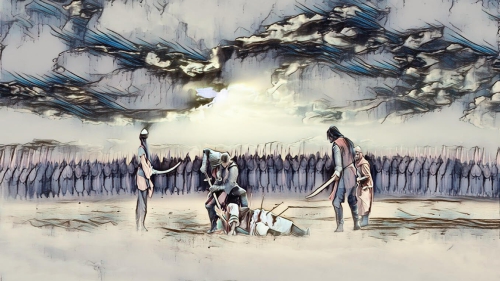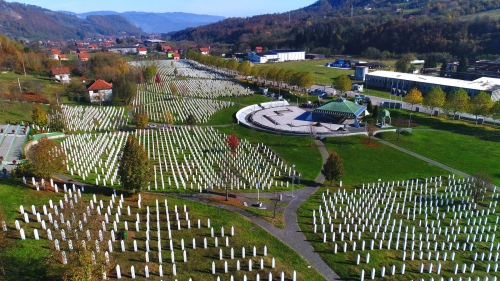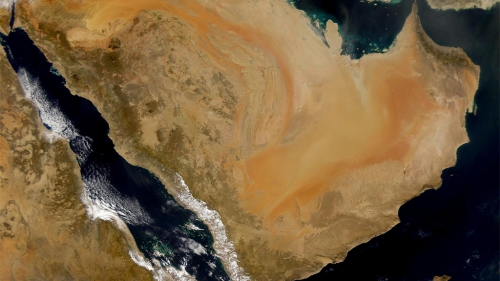Islam's Call for Control: Navigating Humanity's History of Violence

Summary: This article argues that fighting is “natural” and “human”, and that Islam, being a pragmatic religion and a complete way of life, only came to regulate it. All chapters of human existence - commencing with the conversation between the Almighty God and His angels with regard to the character and role of man on earth, and the murdering of one son of Adam at the hands of another, till the modern times when people proudly speak about the “ultimate” civilizational excellence and cultural refinement brought about by the civilizational trajectory of modernity and post-modernity - are peppered with wars and violence. Historiography as a scientific discipline is dominated by references to conflicts, as if there was nothing else. Warfare was a framework within which other human activities and achievements were cast and against which they were measured.
Sure enough, the modern West-dominated civilization - which is regarded as the climax of humankind’s evolution, hence the cliché to the effect that this evolutionary phase signifies “the end of history” and this modern man “the last man” – is an embodiment of the dark sides of the humanness of man and also the irrepressible realization of his primordial aspirations. Despite the claims to the contrary, modern civilization is both antagonistic and befuddling. It connotes a destructive force aimed as much at earth as at heaven, as much against matter as the spirit, and as much against creation as the Creator. Having hitherto mastered principally the skills of domination, exploitation and destruction (killing), credence is thus given to an assertion that this modern civilization is an experiment that went horribly wrong. The experiment is proving a complex exterminating mechanism that is increasingly turning against its very self.
In the middle of all this Islam with its final message – and hope – for mankind was thrust. It was meant to bring the dark sides of man under control and to direct him towards more constructive pursuits. As one might expect, no sooner had Islam emerged on the world stage, than the confrontational propensity of man became further agitated. As a threat to the established world order, anchored in the systems of despotism and injustice, Islam was targeted from the start, first locally then internationally. The issue was not about the prospect of finding and ascertaining the truth, but about preserving the status quo and with it the hidden motives and plans. Whosoever genuinely wanted, it was painless to find out that Islam was the truth and Prophet Muhammad the world’s saviour, however, for the proponents of establishing the bulwarks of tyrannies against the free spread of Islam, the truth was the last thing wanted. Freedom and justice were anomalies, the lack of which was crucial for such people’s socio-political and ideological sustainability patterns.
The response of Islam and Muslims went through three phases: pacifism, self-defence and opening (fath) of the doors of tyrannical regimes to the rays of the Islamic faith. The aim was nothing but the conveyance of the last Testament (the message of the Qur’an as the Word of God) to the world. The shedding of blood was inevitable because the obstacles of despotism and injustice had to be attended to, nevertheless the Islamic types of conflict and killing were honourable. They denoted a virtue. Their worth was twofold. They signified a defensive measure against the destructive power of mischief-mongers and evil-doers, and also a preventive measure against the potentially proliferating acts of theirs.
Muslims did not fight anybody for fighting’s sake. Nor did they threaten anybody with the sheer invasion and subjugation intents. Exclusive of some exceptions, Muslims fought in the way of Allah only, not for any personal, tribal, national, political, economic, expansionist, or imperialist interests. All the secondary concerns had to be aligned with the concern of “rendering the Word of Allah supreme on earth.” Creating Islamic states and empires against the backdrop of this ethics and worldview was a by-product. By no means was it a definitive objective. As soon as Muslims started becoming obsessed with the building of dynasties and empires, the same bent mutated into a contagious sign of weakness. It did not bode well for the future.
In essence, Islam abhors fighting and everything that is associable with it. However, in as much as confrontations between good and evil, and between the truth and falsehood(s), are inevitable and perpetual, Islam, being a pragmatic religion and a way of life, had to deal with the inevitability and mark it with its excellence criteria. Islam did so by conditioning and constraining fighting, and by regulating it with a set of highest terrestrial and heavenly canons.
The restless nature of man as a species and his inborn propensity for hostilities were alluded to when Almighty Allah the Creator announced to the angels that He was going to create man as the vicegerent on earth. On hearing this, and having hitherto acquired a basic notion of the character of this new being, the angels responded: “Will You place upon it (earth) one who causes corruption therein and sheds blood?” (al-Baqarah, 30). The angels wanted to know the appropriateness of the vicegerency office for a being prone to mischief and violent behaviour. Upon that, the angels were informed that theirs was only one way of looking at the divine decision. There was another way, though, implied by the words of Allah that He knew that which the angels did not know, that He had taught Adam (man) “the names of all things” (al-Baqarah, 31).
Parenthetically, this on no account means that man is naturally evil. On the contrary, man is innocent and pure, even possessing a limited inborn moral compass stemming from his fitrah (innate human nature) and intellect. What is envisioned in the above narrative is the state that in the end will become of man, as the Qur’an informs the Prophet: “And most of the people, although you (Prophet Muhammad) strive (for it), are not believers” (Yusuf, 103).
One of the focal messages of the dialogue between Allah and His angels is that while the majority of people will be inclined to corruption on earth and will shed blood, there will correspondingly be the righteous ones, the exemplars of uprightness and truth, who will counterbalance the conduct of the former group. The latter will be industrious in promoting and living virtues, and at the same time will be assiduous in preventing mischief and uprooting the culture of shedding blood for whatever illegitimate purposes, such as sheer expansionism, colonialism, subjugation, lust for power (megalomania) and avarice.
Acting this way will necessitate the shedding of blood, too, but that type of conflict and killing will be an honourable and praiseworthy one. It will be a virtue in itself. Its worth will be twofold. It will signify a defensive measure against the destructive force of mischief-mongers and evil-doers, and a preventive measure against the potentially proliferating acts of theirs. Because the malevolence of those targeted in the conversation between Allah and the angels cannot be eliminated altogether, the same ought to be curbed and kept in check. The consequences of those undertakings, including unavoidable warfare and shedding blood, will be a bitter pill to swallow, derived from the principle of choosing the lesser of two evils. By and large, an overriding rule of life is that an evil is permitted so as to preclude a greater evil or produce a greater good. It follows that Islam’s objective was to normalize and spiritualize the fighting inclination of people, that is to say, to truly humanize and civilize it.
Islam and the sword
When Prophet Muhammad (peace and blessings be upon him and his family) was sent as the last messenger, and the last hope, to the world – as mercy to all dimensions of existence, rahmatan lil-‘alamin – the whole world was suffocating in falsehood, injustice and oppression, bereft of heavenly guidance and compassion. In other words, the world was dominated and controlled by the dark side of man. The human race stood on the edge of an existential abyss. As could be expected, no sooner had the Prophet’s mission been unveiled, than the status quo and the accompanying world-order became challenged. Consistent with the ontological order of things, the two were on a collision course with one another. They had a rendezvous with destiny.
The Prophet and his followers were on an irreversible course to tensions and confrontations, locally and internationally. They had to convey the revealed truth, while much of the world resolved to resist and fight back. As the devotees of the truth of Islam, the rightly-guided and enlightened Muslims wanted nothing but peace, goodwill and harmony, however, they were quickly thrust into the thick of the confrontational penchant of man where total, together with lasting, peace, benevolence and accord were at a premium - like gold dust. To some, the aftermath of embracing Islam must have been a rude awakening in respect of who man and what life, in actual fact, are. What they realized was that their ideals had to be fought for, defended and preserved, every so often with might and main.
If there is any relationship between Islam and the Prophet, on the one hand, and fighting (the sword), on the other, it is against this backdrop. The arrival of Islam and the Prophet spelled troubles for the ruling socio-political and religious classes. The structures of polytheism, corruption and tyranny were shaken to their foundations by the power of the Islamic monotheistic and progressive-qua-reformist message. This way, Islam and its Prophet caused rifts, broke relationships and challenged narratives. They caused havoc and the consequences were predictable. They became despised, prejudiced against, harassed, abused and harmed. The prospect of a total annihilation of the believing communities was often on the cards.
So, the Prophet brought the sword upon himself, and to just survive, let alone succeed in his mission, he had to respond in kind. He had to follow the same procedure. The sword was a defensive apparatus and a deterrent to the cultivated and institutionalized devilish aspects of man. The famous proverb ascribed to Jesus that all who draw the sword will die by the sword, is true, but only insofar as the aggressor’s perspective goes. However, from the defender’s – and also the victim’s – perspective, the same proverb should be reconstructed to the effect that all who draw the sword will survive the world, and all who fight will be able to demonstrate that they are right.
The kernel of the fate of Prophet Muhammad was no different from that of the prince of peace and pacifism, Prophet ‘Isa (Jesus) – yet from the fates of all prophets who had to deal with the entrenched worldly and spiritual criminalities. Jesus is reported to have said: “Do not suppose that I have come to bring peace to the earth. I did not come to bring peace, but a sword” (Matthew, 10:34). An authoritative commentary of these words of Jesus is as follows: “Christ did not here mean to say that the object of his coming was to produce discord and contention, for he was the Prince of Peace; but he means to say that such would be one of the effects of his coming. One part of a family that was opposed to him would set themselves against those who believed in him. The wickedness of men, and not the religion of the gospel, is the cause of this hostility. It is unnecessary to say that no prophecy has been more strikingly fulfilled; and it will continue to be fulfilled until all unite in obeying his commandments. Then his religion will produce universal peace” (Barnes’ Notes on the Whole Bible). Making himself clear Jesus said in the succeeding verses: “For I came to set a man against his father, and a daughter against her mother, and a daughter-in-law against her mother-in-law; and a man's enemies will be the members of his household” (Matthew, 10:35-36).
Conquering lands versus conquering hearts
Moreover, Prophet Muhammad was instructed to convey the Islamic message revealed to him to the world, not to conquer and convert the world, nor to create kingdoms. Enlightening the minds and purifying the hearts was the Prophet’s primary focus from the first day and remained so down the line. Both the world and people belong to the Almighty God. They are part of a grander and more consequential dominion. The record was required to be set straight, in particular with regard to who is who and what is exactly in the grand scheme of things. People were to be shown the way as to why and how not to worship creation but the Creator, and why and how not to deify people but the Lord of people.
What specifically people needed on earth was liberation from the yokes of sorts of falsehood – polytheism being only one of them – setting them then on the road to self-affirmation and self-fulfilment; resultant freedom as a lifestyle due to which people will be able to make their free choices honourably living and as honourably dying by them; and finally people were in need of a new sense of direction towards servitude of the Creator only, in lieu of servitude of the idols of the mind, animalism and matter. Putting it another way, people needed to be acquainted with the final Messenger and the final message given to him (the final and ultimate Testament). They needed conducive socio-political milieus where they will be capable of freely accepting or rejecting Islam, i.e., to take responsibility for their thoughts and actions and their outcomes, to be in charge of their destinies. To be a believer (Muslim and mu’min) or otherwise (kafir) one must undergo this emancipation process and must perform the crucial affirmation duty. The Qur’an accordingly asserts: “And say: ‘The truth is from your Lord, so whoever wills - let him believe; and whoever wills - let him disbelieve” (al-Kahf, 29).
The Prophet and the subsequent generations of his followers were desirous of giving the world what it needed. They were determined upon “opening” (fath) countries and territories and their diverse contexts to the rays of the Islamic monotheistic faith, seeking in turn to “open” the minds and hearts of people with the same end in view. Instead of conquering cities and villages, the Muslims only wished to “unlock” and “open” them for the conveyance of the truth and for the further communication, interaction and dialogue purposes; and instead of conquering and enslaving people, the Muslims only wished to liberate and “conquer” their spiritual and cerebral capacities.
The Muslims wished to win over and capture hearts and minds, for there is no authentic Islam without freedom, and no Islamic fraternity – nay, Islamic civilization - is possible without truly free and enlightened individuals. To be sure, Islamic civilization was at its finest when the spiritual, moral and enlightening determinants were at the helm. However, as soon as the priorities became muddled up, when conquering for conquest’s sake and building empires for expansionism’s sake became an obsession, Islamic civilization, and with it all goodness associated with the miraculous Islamic ideals and tenets, started to tumble.
That is why the Qur’anic concept of “fath” (opening, unlocking), which is bracketed with overpowering and taking control of cities and countries, is wrongly translated as “conquest.” As seen above, the Islamic notion of “conquest” is totally different from the conventional versions found in other civilizations. There is a world of difference between “fath” and “conquest.” While the former is about opening, liberating, empowering and nurturing, the latter is about locking up, subjugating, yoking and debilitating. As a consequence, creating Islamic states and even empires within the framework of the “fath” standard was a by-product. It was a principled expediency demanded by the pressing exigencies of the corollaries of “fath.” Creating states and empires was a means - with a number of exceptions, of course - in service of “fath” as the ultimate goal. Through the lens of Islam, all things considered, fighting is a form of mercy and “fath” a blessing.
From pacifism and self-defence to fighting tyrannies and oppression
Demonstrating this philosophy, the Prophet and the early Muslims were first asked to shun the prospect of fighting completely. Instead, they were bidden to carry on with their sufferings patiently in face of growing harassments and torments by their enemies. The culmination of this pacifist strategy was the migration from Makkah, the epicentre of tyranny, to Madinah, the abode of possibilities and dreams. The Muslims just wanted to be left alone minding their own business and in peace practicing their new faith. They tolerated everybody and accepted everybody’s preferences, so it was natural that others were expected to treat the Muslims likewise. This was a Muslim golden rule whereby one should treat others as he would like others to treat him: “What is hateful to you, do not do to your fellow”, or “avoid doing what you would blame others for doing.”
However, when the enemies of the truth and by extension of Muslims failed to refrain from their provocations, intensifying and yet attempting to internationalize them, enough was enough. Muslims were allowed to defend themselves. The first Qur’anic verses revealed in conjunction with this authorization say it all: “Fight in the way of Allah those who fight you but do not transgress. Indeed, Allah does not like transgressors. And kill them wherever you overtake them and expel them from wherever they have expelled you, and fitnah is worse than killing. And do not fight them at al-Masjid al- Haram until they fight you there. But if they fight you, then kill them. Such is the recompense of the disbelievers. And if they cease, then indeed, Allah is Forgiving and Merciful. Fight them until there is no (more) fitnah and (until) worship is (acknowledged to be) for Allah. But if they cease, then there is to be no aggression except against the oppressors” (al-Baqarah, 190-193).
The following are the guiding principles on fighting that can be extracted from the cited verses:
First, Muslims fight only in the way of Allah, not for any personal, tribal, national, political, economic, expansionist, or imperialist interests. Secondary concerns must be aligned with the utmost concern of “rendering the Word of Allah supreme on earth.” If not, fitnah and fitnah-mongers will be ubiquitous. No life, property, honour and sanctity will be safe then. Besides, there is another Qur’anic verse that reinforces this norm: “Those who believe fight in the cause of Allah, and those who disbelieve fight in the cause of Taghut (evil or Satan). So fight against the allies of Satan. Indeed, the plot of Satan has ever been weak” (al-Nisa’, 76).
Second, Muslims do not fight until they are forced and left with no choice. But when they do, the Islamic concept of comprehensive excellence must apply. Muslims should fight their enemies with such determination and proficiency that they – and other prospective enemies – would think twice before waging wars against Muslims. Muslims ought to strive to make an example of their enemies (“and kill them wherever you overtake them”, “but if they fight you, then kill them (instead of merely fighting them).”
Third, Muslims fight only those who fight them. Muslims must defend themselves, taking back what is theirs: freedom, property, honour and prospects.
Fourth, Muslims do not fight to save oppressors and tyrants, and their minions. These are the tormentors of people, freedom and thought. They stand for the exact opposite of everything a beautiful, dynamic, purposeful and progressive life entails. Their actions are more loathsome and more hurtful than killing.
Fifth, this whole thing notwithstanding, no sooner do the motives for fighting end, than fighting itself ceases. Establishing legitimacy for fighting is anything but easy. Just like in case of other pursuits, fighting, similarly, is a domain where as much sins as rewards can be procured.
Sixth, Islam introduced a comprehensive and fair war ethics that eliminates the unjust use of power. There is no other moral code of war - in classical and modern times - that can rival it. Muslims are bound by the stipulations of their war ethics both when winning and when losing. Either way, Muslims are no more than the servants of a divine exemplar. Other considerations stay in the background. This ethics is encapsulated in the imperative: “do not transgress (in fighting), for indeed, Allah does not like transgressors”, and in the words that Allah is “Forgiving and Merciful” which are placed before another imperative “fight them…” and after alluding to the possibility of ending hostilities. This means that, no matter the odds, if Allah is Compassionate, Generous and Forgiving vis-à-vis all people, Muslims too should be just, considerate, tolerant and forbearing when conducting themselves towards their enemies. As instructed in another Qur’anic verse: “O you who have believed, be persistently standing firm for Allah , witnesses in justice, and do not let the hatred of a people prevent you from being just. Be just; that is nearer to righteousness. And fear Allah; indeed, Allah is Acquainted with what you do” (al-Ma’idah, 8).
These first Qur’anic verses on fighting were later supplemented by the rest of the Qur’anic injunctions concerning the subject matter. Within the bounds of the latter it is commanded as part of the Islamic fighting excellence that the polytheists be fought collectively as they had started fighting against Muslims and continue doing so collectively; that the polytheists be killed wherever they are found, and be captured, besieged and ambushed wherever possible; that if any of the polytheists seeks protection, he should be so given, in order that he may hear the words of Allah, after which he should be delivered to his place of safety; that as long as the polytheists stand true to the Prophet and Muslims, the latter too should stand true to them; that those polytheists who are persistently wicked and rebellious, transgressing all bounds, and who concerning Muslims do not observe any pact of kinship or covenant of protection, should be fought and excluded from peace initiatives; that those who break their oaths after their treaty, and who defame Islam, should be fought, because there are no oaths sacred to them; that those whose wickedness warrant fighting are to be fought until they might cease, based on which the problem is such people’s evil conduct, not their very selves or their religious and national identities; that people generally can be fought – yet are recommended to be fought - if they break their oaths, are determined to expel the Prophet (Muslims), and if they begin attacking Muslims first; that fighting those wretched people is a form of Allah’s punishment and disgrace for them by the hands of Muslims, and also a form of honouring Muslims thereby and healing their breasts (by defending themselves, upholding the truth and chastening evil and evil-doers); that fighting, whenever necessary, cannot be for the sake of any lowly worldly gains, but rather for the sake of Allah and His truth against those “who do not believe in Allah or in the Last Day and who do not consider unlawful what Allah and His Messenger have made unlawful and who do not adopt the religion of truth”; that, in compliance with the principle of fighting in the cause of Allah, fighting also should be “for the oppressed among men, women, and children who say: ‘Our Lord, take us out of this city of oppressive people and appoint for us from Yourself a protector and appoint for us from Yourself a helper’” (al-Tawbah, 5-29, 36; al-Nisa’, 75).
The above guiding principles on fighting are crowned with several pioneering and rather general Islamic teachings, some of which are as follows.
First, the freedom of thought and belief is ensured: “There shall be no compulsion in (acceptance of) the religion. The right course has become clear from the wrong” (al-Baqarah, 256).
Second, human life is sacred. A single innocent life is equivalent to the lives of all mankind: “Because of that, We decreed upon the Children of Israel (and herewith upon Muslims as well) that whoever kills a soul unless for a soul or for corruption (done) in the land – it is as if he had slain mankind entirely. And whoever saves one – it is as if he had saved mankind entirely” (al-Ma’idah, 32).
Third, Muslims are free to be righteous and deal justly with those who do not fight them because of Islam, nor strive to expel them from their homes: “Allah does not forbid you from those who do not fight you because of religion and do not expel you from your homes - from being righteous toward them and acting justly toward them. Indeed, Allah loves those who act justly” (al-Mumtahanah, 8).
Fourth, Muslims cannot have friendly relations with those who fight them because of Islam, drive them out from their homes, or support others in doing thus: “Allah only forbids you from those who fight you because of religion and expel you from your homes and aid in your expulsion – (forbids) that you make allies of them. And whoever makes allies of them, then it is those who are the wrongdoers” (al-Mumtahanah, 9).
Fifth, Islam is the religion of justice. Originating in the heavenly spheres and operating under the aegis of the revealed frame of reference, justice is paramount in Islam. It connotes an ontological paradigm, celebrating the humanness of man and the transcendence of the Creator. Unlike the other justice models, the Islamic model of justice is blind when it comes to relationships, stakes and emotional attachments. The Qur’an proclaims: “O you who have believed, be persistently standing firm in justice, witnesses for Allah, even if it be against yourselves or parents and relatives. Whether one is rich or poor, Allah is more worthy of both. So follow not (personal) inclination, lest you not be just” (al-Nisa’, 135).
Sixth, fulfilling all kinds of contracts, bonds and obligations, delivering trusts back to their owners, speaking kindly to mankind, and judging between people (and dealing with them) justly (al-Baqarah, 83; al-Ma’idah, 1; al-Nisa’, 58) – these make up the backbone of the Islamic social contract. “Excellent is that which Allah instructs you. Indeed, Allah is ever Hearing and Seeing” (al-Nisa’, 58).
Seventh, the rights of those to whom Muslims have given a covenant (mu’ahadah) are guaranteed both on earth and in heaven. The Prophet said: “Indeed, whoever kills a mu’ahid (a non-Muslim under a covenant) that has a covenant from Allah and a covenant from His Messenger, then he has violated the covenant with Allah and the covenant of His Messenger, so he shall not smell the fragrance of Paradise; even though its fragrance can be sensed from the distance of seventy autumns” (Jami’ al-Tirmidhi).
Islam is not hawkish, nor are Muslims war-mongers
That the Prophet and his companions – whose life pattern is attempted to be followed thenceforth – were not war-hawks and were not disposed to fighting unless really necessary, testifies the fact that, internally, theirs was either passive resistance (pacifism) while in Makkah or self-defence while in Madinah, and externally, the Prophet just wished to convey his universal message to the world, after which the consequences of uninhibited acceptance or rejection will fall on the shoulders of people themselves and their rulers, hanging on who exactly was influencing whom and to what extent. There was a divine instruction that must have weighed heavily on the Prophet’s mind: “O Messenger, announce (balligh, i.e., announce, deliver, proclaim and preach) that which has been revealed to you from your Lord, and if you do not, then you have not conveyed His message. And Allah will protect you from the people. Indeed, Allah does not guide the disbelieving people” (al-Ma’idah, 67). The Qur’an also informs the Prophet that he was not responsible for whatever happened after his proclamation and conveyance of Islam to the world, for he was not people’s guardian (hafidh), nor controller or overseer (musaytir): “And if they submit (in Islam), they are rightly guided; but if they turn away - then upon you is only the (duty of) notification (the delivery of the message)” (Alu ‘Imran, 20).
Thus, as soon as the internal matters in Madinah stabilized somewhat, following the signing of the Hudaybiyah treaty with the Makkan polytheists towards the end of the sixth year of Islam’s presence in Madinah, the Prophet decided to send messages to the kings and rulers beyond Arabia calling them to Islam. In order to authenticate the credentials of his envoys, a silver seal was made in which were engraved the words: “Muhammad the Messenger of Allah.” The Prophet sent his envoys with invitations to Islam to the following kings and rulers: the king of Abyssinia (Ethiopia), the ruler of Egypt, the emperor of Persia, the king of Byzantium, the governor of Bahrain, the governor of Yamamah, the ruler of Damascus, and the king of Oman and his brother. “Through these letters, the Prophet managed to communicate his message to most monarchs at that time; some believed, while others remained obdurate and persisted in their disbelief. However, the idea of embracing Islam, and the advent of a new Prophet preoccupied all of them” (Mubarakpuri, The Sealed Nectar).
The content of the international correspondence was indicative of a pattern. The Prophet asked the kings and rulers to accept Islam and be saved in this world and in the Hereafter; to continue in their office even after agreeing to accept Islam and whatever was under their command was to remain theirs (their countries will remain in their hands); to let people be free and, if they wanted, to let them embrace and practice Islam freely; and to make those who declined to accept Islam pay the jizyah tax which was in lieu of military service (considering how much the jizyah was and what it was a surrogate for, non-Muslims were in a position of advantage). But if they refused to become Muslims, the Prophet warned the kings and rulers that the burden of the sins of all their people shall fall on their shoulders (because of the principle: cuius regio, eius religio, which means “whose realm, their religion” or “he who governs the territory decides its religion”); that Islam will prevail anyway – as a miraculous announcement concerning a development whose signs were omnipresent - so it was better that they hastened to jump on the bandwagon; that their kingdoms were fading in comparison to the power of the prophethood; and that everything they possessed was in danger of extinction in advance of the expected victories of the heavenly truth of Islam.
The Prophet did not threaten anybody with force, or invasion. He was sincere, trustworthy and compassionate. Knowing the future civilizational trajectory of his Islamic message, the Prophet, consequently, was a warner and a giver of glad tidings. His divinations that disobedient and insolent territories will perish, will be overrun and appropriated by Muslim armies, and that the prophethood will assume preponderance over kingdoms, should not be understood in terms of an Islamic imperialism or colonialism, but rather in terms of the powerful laws of the rise and collapse of civilizations which, when they fall in place, inescapably lead to the predictable conclusions. And when such happens, both internal implosions and external as much calculated as impulsive liaisons get to be at work and contribute to the transformations. People become but instruments of destiny, of divine providence. The gist of those laws are abridged in these Qur’anic words: “And say: ‘Truth has come, and falsehood has vanished. Indeed is falsehood, (by nature), ever bound to vanish’” (al-Isra’, 81); “Say: ‘Truth has arrived, and falsehood (from there on) neither creates anything new, nor restores anything (falsehood shall vanish and shall not come back)’” (Saba’, 49).
A good number of international players became obsessed – for good or for bad - with the new message originating from the Arabian Peninsula. However, not all were happy about the developments. The message was seen as a threat to the prevalent world order, so the latter’s custodians were not inclined to accept the Muslim case into the club. Like their former counterparts in Makkah, the international protagonists, too, could discern as to the distinctiveness of Prophet Muhammad and the moral fibre of his Islamic message, but refused to back down. There were plenty of other geopolitical and sociocultural considerations that presided over decision making, relegating the proven integrity of the Prophet and his teachings to a subordinate role. Which is actually the tactic of Satan, who was familiar with basically everything relating to the character and tone of each of the truth and falsehood, but remained faithful to his arrogance, self-centeredness and passion. Instead of ruling those, Satan was ruled by them. Instead of subjecting them to the requirements of the ultimate grades, the pre-eminence of those grades was compromised and was reduced to the ignoble ranks of solipsism. In consequence, Satan never leaves the truth and its people alone.
In the same vein, the international central characters never left the truth of Islam and Muslims alone. Even during the Prophet’s time they aspired to meddle in the internal affairs of Muslims, seeking to undermine the outlooks. The interferences were either direct or through proxies. Later when Islam started to spread its wings beyond the confines of Arabia, the same protagonists decided either to stop the spread of Islam’s influenced by force, or to create bulwarks or their countries’ front walls (the antemurale myth) against the expansion. In this case, fighting against tyrannies, which shut themselves off from contacts with Islam and thus denied their citizens freedom and right to know, became foreseeable. The obstacles of despotism and injustice had to be attended to.
But then again, the ensuing warfare was not for warfare’s sake or for the empire-building aims, but for the opening (fath) and unlocking of the impenetrable environments so that freedom and uprightness could win out. At the back of the unfortunate wars, it was natural that the victorious Muslims stayed and administered the newly-opened-to-Islam countries to ensure what people had fought for remained in force. In so doing, Muslims did not hesitate to cooperate with and seek assistance from the locals concerning essentially all spheres of life, to retain local cultures, traditions and languages, to guarantee liberties, justice and respectability, and to integrate whatever was wholesome and beneficial into the escalating global spectacle of Islamic civilization. Muslims offered Islam to the world, but were ready to embrace all that was viable from the world in return. A new fusion was on the horizon.
















